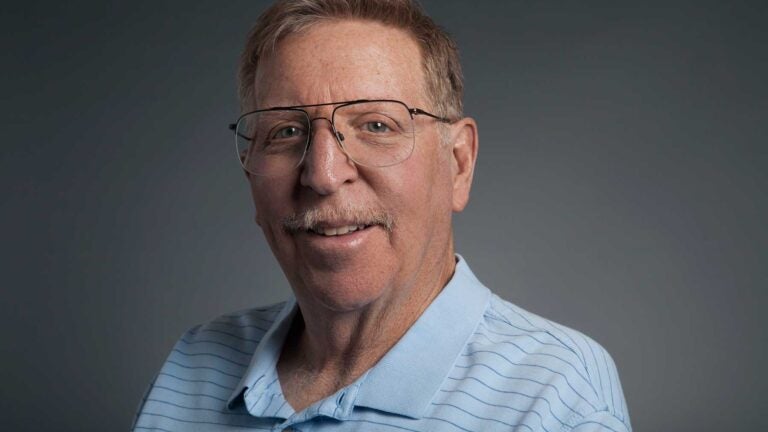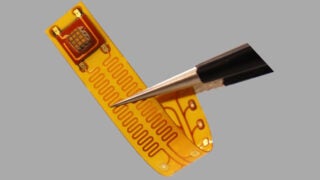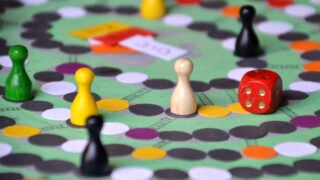
David Karchem has used his own experience as a stroke survivor to build an online community to help others heal. (Photo/Nate Jensen)
Stroke survivor finds new calling as USC volunteer
David Karchem was a software developer until a stroke changed his life. Now he’s focusing on building a community for stroke survivors
One morning in 2009, USC physical therapy volunteer David Karchem was driving through an intersection near California State University, Northridge.
While making a left turn at a light, he was suddenly struck by an intense headache. He couldn’t manage to press the clutch of his manual transmission car, so he coasted through the intersection the best he could while the other cars honked and swerved around him.
“I wrote a note that said, ‘CALL 911’ and then I just passed out,” Karchem recalled.
When he awoke in the hospital, Karchem learned his world had been forever changed.
In an instant, he had joined the nearly 6.5 million stroke survivors in the United States.
Karchem had experienced a right-brain ischemic stroke. Two blood clots over the right side of his brain had left him paralyzed on his left side. A third clot near the back of his brain, where the visual cortex is located, left him struggling to see and unable to taste or smell anything.
It took him weeks after surgery to learn to walk again. After six months of traditional inpatient and outpatient rehabilitation and intensive work with computer-assisted brain function and vision processing computer programs, Karchem recovered his driving privileges. He also participated in six weeks of occupational robotic training and soon began to mentor other patients.
Connecting with others
Once a software developer, Karchem found he could no longer wrap his brain around programming.
But he found other ways to keep busy. For the past seven years, Karchem has volunteered at USC, taking part in studies at the USC Division of Biokinesiology and Physical Therapy and training students.
He also tries to connect other stroke survivors to appropriate research studies.
In talking to stroke survivors, Karchem discovered a social media site where people can share their experiences and insights during stroke recovery. Originally called Wohaula (Mandarin for “I have survived”) the site, now called StrokeFocus, has more than 300 users. He volunteered to be an adviser to the group and has been working with them for several months.
It is designed for honest and in-depth conversations, Karchem said, and can also connect survivors with expert lectures and trainings. The site even received a 2017 Small Business Administration innovation award by the Los Angeles District Office of SBA.
“It’s a private group, which makes it more valuable than Facebook,” Karchem explained.
“People are sometimes afraid to post their problems. If they’re fighting with a spouse or struggling, it’s hard to talk about.”
The myth of stroke recovery
In addition to building a community, Karchem has continued to strengthen his own knowledge, having earned a master’s degree in assistive technology from Cal State Northridge in 2014.
And his journey to recovery hasn’t stopped. Last New Year’s Eve, something surprising happened: Karchem tasted food for the first time since 2009.
“It really speaks to what happens with people when they go through multiple phases of recovery,” Karchem said.
He said there’s a myth in physical medicine: If a patient doesn’t recover the functionality in the first 90 days, he or she never will. But Karchem has experienced his recovery in waves. For example, he still can’t raise his arm above the shoulder on his left side.
“But a few days after regaining the smell and taste, I regained some control of my left wrist and fingers for the first time,” he said.
‘Get ’em moving’
Karchem said he will continue to do whatever he can to support USC, particularly in his role as a division volunteer, and he hopes to encourage other stroke survivors to take part in the many stroke studies being conducted at the USC Division of Biokinesiology and Physical Therapy.
“One of the problems the division was having is that they didn’t have enough subjects for their research, so I had the idea to visit the stroke support groups and recruit subjects for research projects,” said Karchem, who credits participating in research at the division for improving his life.
Whether reaching out to participate in studies at USC or taking part in support groups, Karchem’s advice to other stroke survivors is simple: Avoid isolation.
“Get ’em moving,” he said with a grin. “There are so many things that are going on you can do, either with family or with support groups. And of course, there is the internet, where you can stimulate your brain.”
To get involved in research taking part at the division, send an email to david.karchem@strokefocus.net.



